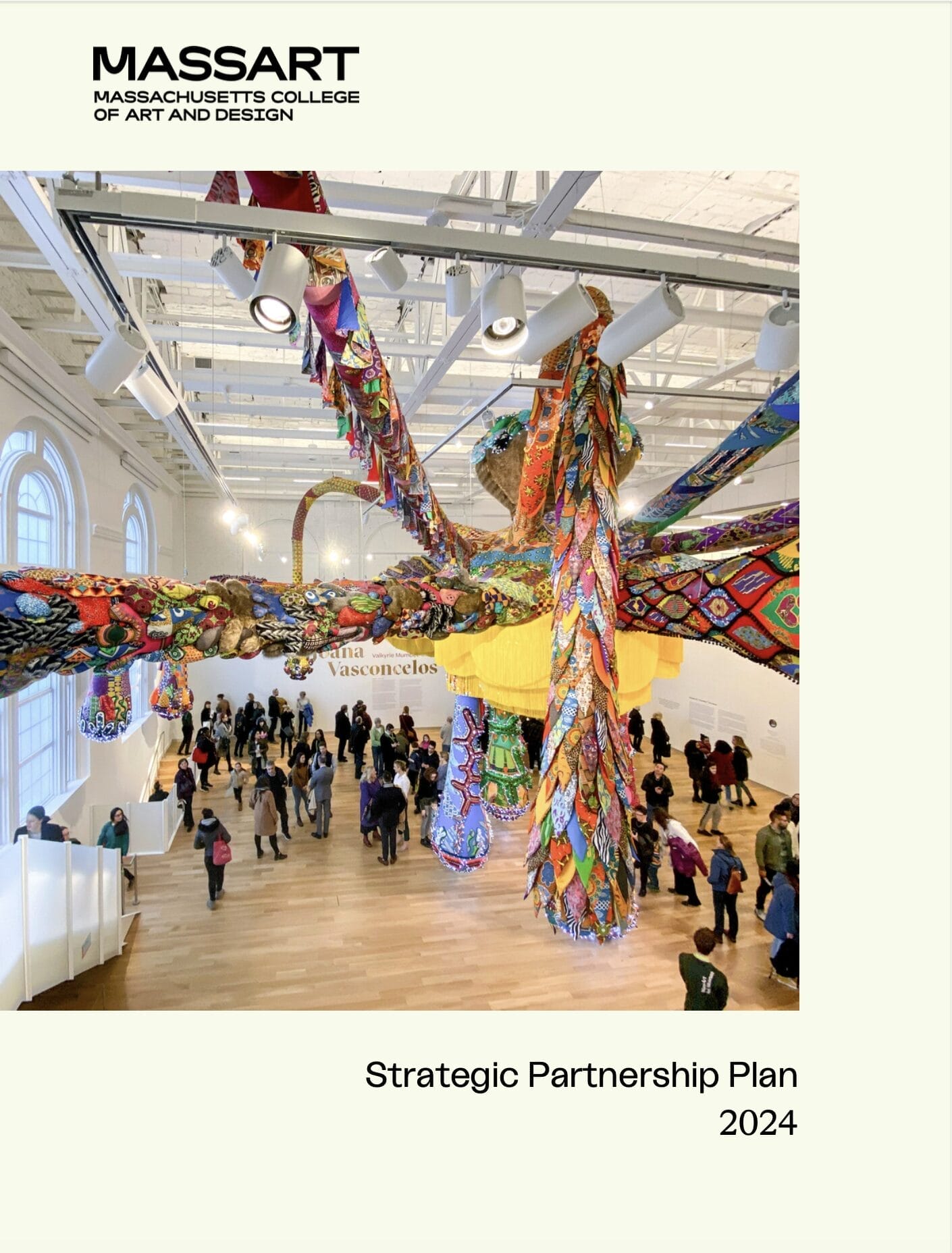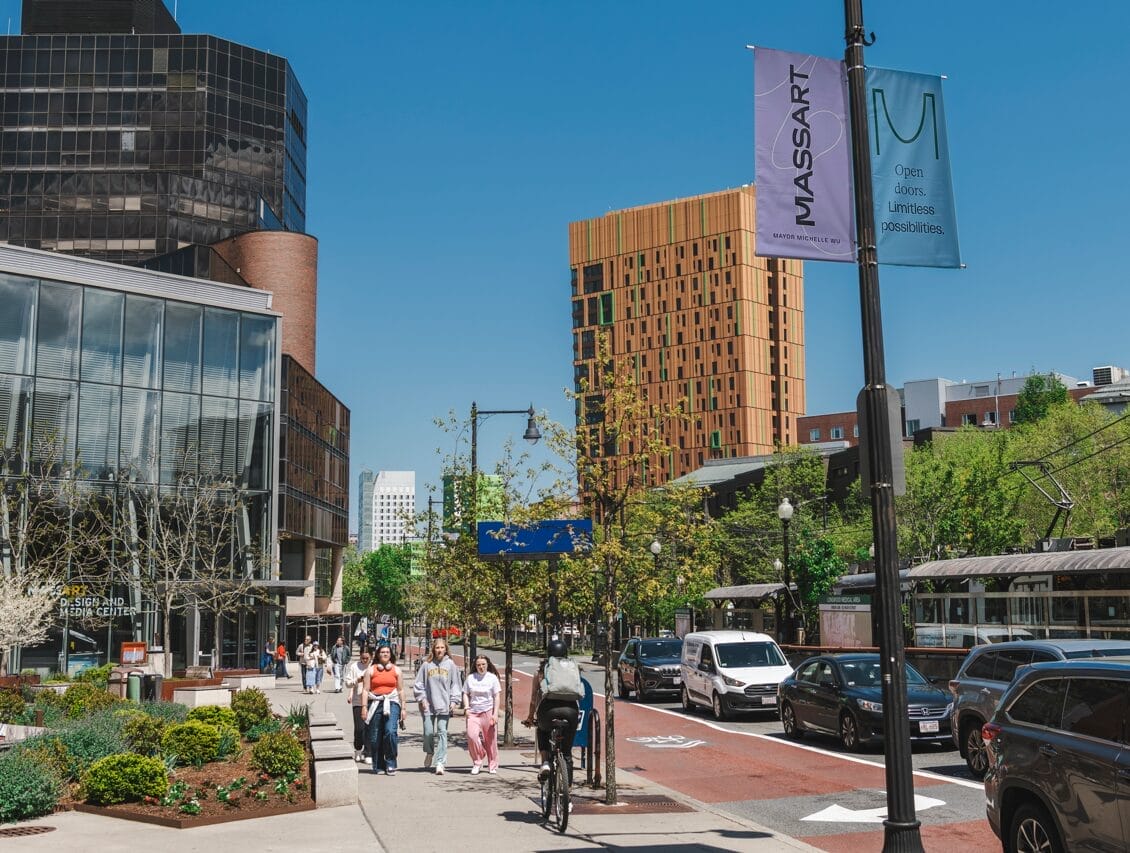
Assessing the Revitalized Plan and Evaluating Its Success
View and Download
As we concluded our 150th Anniversary year, we found ourselves at the midway point of our strategic plan. The plan not only had a well articulated 10-year horizon but was framed around bold strategies and strongly held shared values. These milestones provide an opportunity to acknowledge our accomplishments and engage in a process to review and refresh our strategic plan. President Grant convened stakeholders and engaged the campus to review the College’s progress and to develop a strong, forward-looking, refreshed plan.
As we initiated this process, we heard the following messages:
Our Mission and Values are powerful and remain highly relevant. In particular, the Values have served us extraordinarily well as we negotiated the pandemic. The five priorities – our set of ambitious goals – serve us well and we should continue to build upon them. MassArt has made great progress on our 10-year plan. We are planning from a position of strength.

Assessing the Revitalized Plan and Evaluating Its Success
View and DownloadThe refreshed strategic plan is grounded in the MassArt Mission and Values, and Priority Areas. A series of bold, high-level strategies for realizing them constitutes the framework for action for the next five years. The new Strategic Partnership Plan brings together two planning frameworks – the MassArt Strategic Plan and the MassArt Partnership Plan – to cohesively guide all aspects of the work of the College. It establishes a set of strategic aims and, in doing so, brings greater focus to our work and a harmonized approach to measuring our progress.
Integrating the Strategic Plan & Partnership Plan
As an independent public institution with a special purpose designation from the Commonwealth of Massachusetts, MassArt received approval from the Board of Higher Education (BHE) nearly 20 years ago, under Chapter 26 of the Acts of 2003, Sections 49, 50, 633, and 634, to enter into a strategic partnership plan. This legislation provided the MassArt Board of Trustees the ability to expand our mission, profile, and orientation to a more regional or national focus and to submit to the BHE, for approval, five-year plans embracing an entrepreneurial model focused on achieving higher levels of excellence. In 2005, the Legislature approved language to make permanent the provision in Section 633 that allowed the MassArt Board of Trustees to retain all tuition and fee revenue.
This partnership has been renewed several times over the last 20 years, and has continued successfully to the present day. MassArt has operated with the flexibility and autonomy to achieve its educational aspirations, fulfill its mission as the only independent public college of art and design in the country, develop non-state revenues, and strengthen its role as a cultural and educational resource for other public institutions. As part of the agreement, MassArt committed to assessing and sharing progress of the plan’s proposed goals and objectives and to adapting and implementing strategies to achieve the identified goals and objectives. The 2024 Strategic Partnership Plan will provide the basis for that assessment, reporting, and adaptation for the coming five-year period.
The Strategic Plan goals, along with several others, are part of a revitalized Strategic Partnership Plan, grounded in a series of bold, high-level strategies for realizing them in the next two to five years.
The plan has five major priorities, as did the 2019 plan:
Justice, Equity, Diversity, and Inclusion
Environment for a Creative Campus
Quality Workplace and Effective Organization
Transformative Learning and Teaching
Reputation and Resources
To ensure that the overarching priorities of the plan are being achieved through implementation of each strategy’s specifics, a number of targeted steps have been put into place or are underway.
MassArt will enhance the use of data to guide student learning and success; inform teaching practices inclusive of diverse learning; and create an entrepreneurship hub to focus on the intersection of art and business.
Meet the diverse learning needs of the student body in and out of the classroom; heighten the focus on our undergraduates’ second year to open opportunities and improve retention; strengthen student support, engagement, and advising.
Prioritize JEDI practices and procedures that are respectfully developed and communicated to recruit, retain, and support a high-quality and highly engaged workforce; intentionally support ALAANA faculty; Invest in a Human Resources team that serves as an essential strategic partner to every aspect of the College.
Help level the economic playing field at MassArt through a commitment to “creative equity” by ensuring equitable access to supplies and resources; revise and enhance transfer policies to eliminate barriers to entry and success; expand hybrid, innovative, collaborative learning opportunities to better meet the needs of adult and other non-traditional learners.
Secure MassArt’s role in the Commonwealth, nationally, and globally both in conversations and in partnerships regarding the impact of the arts and design on culture and communities, and the larger society; prepare students for civic engagement through the arts, and connect student work to global challenges, such as climate change; expand engagement with alumni network.
MassArt has a robust set of processes in place to gauge our success in implementing the updated Strategic Plan.
At the conclusion of the plan, the College will evaluate the impact of the high-level strategies, with a focus on identifying the difference that the plan has made in areas such as student success, for example, by using retention and graduation rates and complementary qualitative data.
One hallmark of the strategic planning process was a series of input and review
sessions. The President and the Strategic Planning Committee convened these discussions at key junctures in the process to ensure that the MassArt community could inform each stage of the plan’s development.
Early discussions focused on broad-based information gathering, while later ones were designed for input on the emerging plan. Once the preliminary plan was developed, the sessions focused on the various roles that each group would play in bringing the plan to life.
Strategic Planning Committee Members
This refreshed plan is the product of exemplary cross-campus engagement and collaboration. We are grateful to members of our Strategic Planning Committee for their discerning and innovative approach to the planning process. They listened with open hearts and minds to the challenges and aspirations voiced by our students, faculty, staff, trustees, and alumni. Then, building on our accomplishments, they wove the essential work already underway at the College together with bold, future-oriented strategies that will expand and deepen our impact.
| Julie Barrett, Associate Dean of Justice, Equity, and Transformation/Executive Director of Project Management |
| Lucinda Bliss, Associate Provost/Dean of Graduate and Professional and Continuing Education |
| Robert Chambers, Vice President for Strategic Engagement and Chief of Staff |
| Julia Crane-Dempsey, Director of Annual Giving |
| Schuyler Dawson, Administrative and Special Projects Coordinator |
| Andrew Dore, Assistant Dean and Director of Housing and Residence Life |
| Barrington Edwards, Associate Professor, Illustration |
| Mary K. Grant, President |
| Deborah Hirsch, Special Assistant to the Provost |
| Emily Karafelis, Second Year Graduate Student, Design Innovation |
| Ceci Méndez-Ortiz, Executive Director, Center for Art and Community Partnerships |
| Brenda Molife, Provost and Vice President for Academic Affairs |
| Junelyn Peeples, Assistant Vice President of Institutional Research and Strategic Effectiveness |
| Jonathan Rand, Assistant Dean and Registrar |
| Maryellen Schroeder, Director of Career Development |
| Lily Schueger, Third-Year Undergraduate Student, Ceramics |
| Gina Spaziani, Associate Vice President of Finance/Chief Business Officer |
| Nita Sturiale, Professor and Department Chair, Studio for Interrelated Media (SIM) |
| Jennifer Varekamp, Professor and Department Chair, Fashion Design |
The Strategic Plan was unanimously approved by the Board of Trustees in June 2024 and was approved by the Board of Higher Education in October 2024. The College kicked off and engage the campus in the implementation of this work in late fall 2024, and will continue to issue annual reports on progress towards the plan’s goals.